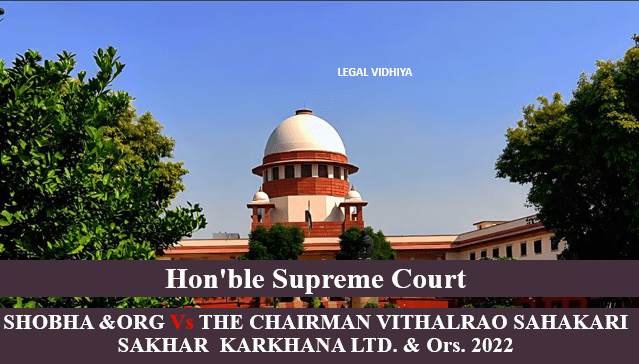
| CITATION | SCC 272 2022 |
| DATE OF JUDGMENT | MARCH 11, 2022. |
| COURT | SUPREME COURT OF INDIA |
| APPELLANT | SHOBHA &ORG |
| RESPONDENT | THE CHAIRMAN VITHALRAO SAHAKARI SAKHAR KARKHANA LTD. & ORS. |
| BENCH | M.R. SHAH, J., B.V. NAGARATHNA. J |
INTRODUCTION
When an employer hires a new employee, he is not only bringing human force but also starting a new relationship. The aim of the Workmen’s Compensation Act 1923 was to provide some relief in case of an accident and during the course of employment.
FACTS OF THE CASE
The deceased was a labourer. While cutting sugarcane. He died of a snake bite on the date of 29.11.2009. Neither the contractor nor the factory owner paid the compensation. Therefore the appellants (heirs of the deceased) filed a claim before the commissioner workmen’s compensation and claimed 5 lakh.
On the date of 25.10.2017, the commissioner ordered to pay a compensation amount of ₹3,06,180 along with simple interest of 12 per annum from the date of the accident 29.11.2009. The commissioner also imposed a penalty of 50% on the compensation amount i.e. ₹1,53,090
Respondent filed an appeal before the high court and the high court gave the judgement that he dismissed the appeal about the amount of compensation awarded by the commission as a concern but set aside the penalty and modified the interest of 12 % from the date of the incident and changed the date to after expiry of one month from 25.01.2017. Feeling dissatisfied by the high court judgement appellant files an appeal before the Supreme court
ISSUES RAISED
- Whether the respondent is liable to pay the compensation or penalty or both?
2. .Whether the respondent is liable to pay the amount of compensation from the date of the incident or front the date of commissioner order?
CONTENTIONS OF APPEALENT
1. When the employer does not pay compensation within one month The liability to pay the compensation would arise from the date on which the deceased died for which the deceased died for which he is entitled to the compensation and liability to pay the interest on the amount of arrears/compensation shall be from the date of accident and not from the order passed by the commissioner.
2. When the employer does not pay compensation within one month from the date of accident, he is liable to pay the compensation amount of simple interest of 12% per annum with addition to the amount of arrears.
3. The High court has considered section 4A(3)(b) only which deals with imposition of penalty. High court has not noted section 4A(3)(a) of the employers compensation act 1923
4. When the employer is in default in paying compensation within one month from the date it fell, the employer has to pay compensation of simple interest at 12% from the date of accident. Alongwith with compensation respondent also has to pay penalty upto 50%
CONTENTIONS OF REPONDENT
1. From the date of the accident, he is only liable to pay the compensation amount of simple interest of 12% per annum in addition to the amount of arrears under section 4A(3)(a) there is no need to pay the amount of penalty.
2. The respondent does not have a reasonable opportunity to show for cause why the penalty should not be passed under section 4A(3)b
3. The liability for paying the compensation would arise from the date on which orders have been passed by the commissioner.
4. If the commissioner is satisfied that there is no jurisdiction for the delay, it can direct the employer, in addition to the amount of the arrears and interest to pay a sum not exceeding 50% of such amount by way of penalty
JUDGEMENT
The order passed by the high court has been set aside and gives the judgement that Appellant shall be entitled to the interest of @12%p per annum on the amount of compensation on the date of incident.29.11.2009. The respondent is liable to pay the compensation from the date of accident and he is also liable to pay a penalty of 50% on the compensation amount.
CONCLUSION
In conclusion, The decision taken by the supreme court is for the benefit of the company as without happy employees no business can run. Productivity level is very crucial in growing business. And without happy employees no productivity will came. But the legal justice system has needed some changes as the justice given is too long for them.
REFERENCES
This Article is written by Sandeep Kumar student of Banaras Hindu university faculty of law, Intern at Legal Vidhiya.
Disclaimer: The materials provided herein are intended solely for informational purposes. Accessing or using the site or the materials does not establish an attorney-client relationship. The information presented on this site is not to be construed as legal or professional advice, and it should not be relied upon for such purposes or used as a substitute for advice from a licensed attorney in your state. Additionally, the viewpoint presented by the author is of a personal nature.




0 Comments